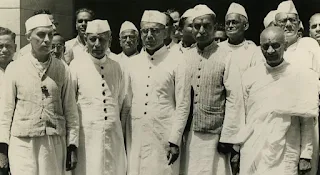For the masses of India, it was a long-awaited culmination for a hundred-year struggle. It should have been a “government of the people, by the people, for the people” that should have been formed. Instead, what was formed was a government of compromise or a series of compromises for power. As Munshi (1967:48) noted “In 1946-47, the Interim Government, formed at the Centre, of Congress and League representatives, was a ghastly failure.” He adds “[L]ooking back over the years … if the decision had been otherwise, the whole country would have been at the mercy of the Muslim League.” The bloodbath unleashed by the League on the ‘Direct Action Day’ on August 16, 1946, bear testimony to this.
According to some analysts the INA trials of (Subhas Chandra Bose’s Indian National Army) which were held between November 1945 and May 1946 and the [Royal] Indian Naval Mutiny between February 18 and 25 1946 convinced the British that they could no longer hold on to power in India. The British ‘Cabinet Mission’ plan of June 1946 set a target date of June 1948 for what it called the ‘transfer of power’ to the Indian leadership. Appointed to execute the ‘plan’, Lord Mountbatten, however advanced the date to August 1947. His unseemly haste to score a personal achievement led to disastrous consequences, with about two million lives lost.
As a first step for the ‘transfer’, the British formed an ‘Interim Government’, which was in fact, inclusion of a Cabinet of Indian leaders in the Viceroy’s Executive Council. A group of ministers headed by Jawaharlal Nehru [as Vice President of the Executive Council] was sworn in on September 2, 1946. Jawaharlal Nehru became the Vice President by virtue of his being the President of the Congress party.
The ‘Constituent Assembly’ too was a British creation following the implementation of the ‘Cabinet Mission Plan’. However, the body was not constituted on the principle of universal adult franchise but indirectly elected from the provincial assemblies. Could a body constituted by the imperial power (which therefore it had the right to abolish it) has the moral authority to draft a ‘Constitution’ for governance of the liberated nation? Dr. B. R. Ambedkar (the Chairman of the Drafting Committee) acknowledged the moral dilemma and the weakness inherent in the Constituent Assembly to write the Constitution. (Deb, 1949: 1644-67)

Turning back to the formation of the ‘Interim Government’, by June 1946, when the ‘Cabinet Mission Plan’ was announced, it was clear that the president of the ‘Indian National Congress’ would be anointed the head of the government. Abul Kalam Azad who was the Congress president did not seek re-election (as he originally intended) but stood down in favour of Jawaharlal Nehru. (Azad, 1960:167). There were two contenders, one was Vallabhbhai Patel and the other J. B. Kriplani, who later became president in the same year. M. K. Gandhi made it clear that the president should be elected unanimously and favoured Jawaharlal Nehru. As he did on several earlier occasions (twice when Subhas Chandra Bose and once when Vallabhbhai Patel were the favoured candidates), he contrived to nullify the election and have ‘his man’ elected! Having headed the ‘Interim Government’, since September 1946, it was but natural for Jawaharlal Nehru to be ‘anointed’ the first prime minister of independent India in August 1947. He thus continued to be the unelected prime minister for another five years till the first general elections were held in 1952.
In the interim, between 1946 and 1952, the unelected ‘Constituent Assembly’ functioned as the parliament and carried out amendments to a ‘Constitution’ it wrote! The Constituent Assembly submitted the Constitution to the president on November 26, 1949 which was adopted on January 26, 1950. The first amendment was enacted on June 18, 1951, i.e., within eighteen months of its adoption! Curiously the very first amendment of the nascent democracy aimed at curbing freedom of speech and stalling judicial scrutiny of legislations.
References
Azad, Abul Kalam. (1960). “India Wins Freedom”. Longmans, Green & Co.
London.
"Constituent
Assembly Debates". Vol. IX, 17 September 1949.
Munshi, K. M., (1967). “Pilgrimage to Freedom”. Bharatiya Vidya Bhavan. Bombay.

